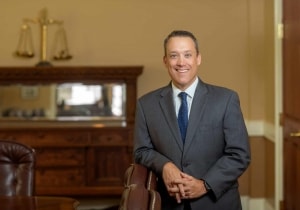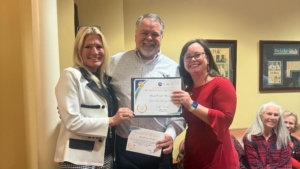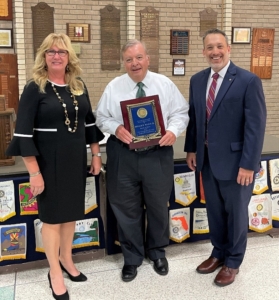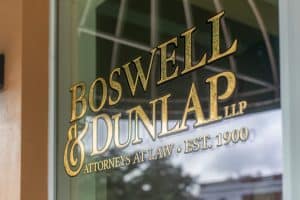Chilton to Host HOA Board Certification Courses
 Over the next few months, Robert Chilton is planning to host three online HOA Board certification courses. Mr. Chilton is certified by the Florida Department of Business and Professional Regulation to provide board member certification courses Section 720.3033(1) of the Homeowners’ Association Act. Each new HOA director is required to complete the course within 90 days of their election or appointment.
Over the next few months, Robert Chilton is planning to host three online HOA Board certification courses. Mr. Chilton is certified by the Florida Department of Business and Professional Regulation to provide board member certification courses Section 720.3033(1) of the Homeowners’ Association Act. Each new HOA director is required to complete the course within 90 days of their election or appointment.
Courses are scheduled for the following dates and times:
Wednesday, January 21, 2026 – 5:30 pm
Wednesday, February 18, 2026 – 5:30 pm
Wednesday, March 25, 2026 – 5:30 pm
The deadline to RSVP is 48 hours before each course. Once completed, each attendee will receive a signed Certificate of Completion which must then be filed with the HOA’s official records. If you are interested learning more, contact Mr. Chilton’s legal assistant, Erica Jessie (erica@bosdun.com; 863-533-7117). The course fee is $100.00 per attendee. Mr. Chilton also offers community-specific courses for those who prefer a session tailored to their association.
Business of the Month – Boswell & Dunlap LLP
 Boswell & Dunlap, LLP is thrilled to receive the Business of the Month award from the Bartow Chamber of Commerce for December of 2025! Here is the chamber’s announcement:
Boswell & Dunlap, LLP is thrilled to receive the Business of the Month award from the Bartow Chamber of Commerce for December of 2025! Here is the chamber’s announcement:
We are proud to recognize Boswell and Dunlap LLP as our Business of the Month for December!
Boswell and Dunlap LLP is one of the Bartow Chamber’s most dedicated members, demonstrated by their consistent sponsorship of most Chamber events and their tradition of hosting our annual December Fun Thursday. Sean Parker, a partner at Boswell and Dunlap, serves on the Chamber Board, and Jillian, who is also a partner, is a dedicated Chamber Ambassador and member of ENGAGE. Furthermore, the firm supports employee development through participation in both Leadership Bartow classes and the ENGAGE Young Professionals group. Boswell and Dunlap LLP’s deep commitment makes them an exemplary business and our proud Business of the Month.

2025 Statutory Update – Community Association Law
 Another summer session of Florida’s legislature has come and gone and with it, some important changes to statutes affecting condominiums, cooperative associations and homeowners’ associations. What follows is a summary of some of the highlights from the 2025 Florida Legislative session.
Another summer session of Florida’s legislature has come and gone and with it, some important changes to statutes affecting condominiums, cooperative associations and homeowners’ associations. What follows is a summary of some of the highlights from the 2025 Florida Legislative session.
Chapter 2025-175, Laws of Florida (Adopted June 23, 2025; Effective July 1, 2025)
Community Association Managers (Chapter 498, Part VIII, Florida Statutes):
- Adds legal obligations owed by CAMS and management companies.
- Requires special language in each CAM contract that the manager will abide by all professional standards and record keeping requirements imposed by applicable law
- Prohibits CAMS from acting in violation of applicable law, even if directed by an association to do so.
- Prohibits inclusion in management contracts of liability reduction provisions or waivers for failing to comply with applicable law.
- Heightens disclosure requirements were the CAM or management company proposes to provide non-management services
Homeowners’ Associations (Chapter 720, Florida Statutes): There were no amendments to the Homeowners’ Association Act.
Condominium Associations (Chapter 718, Florida Statutes):
- Meetings By Video Conferencing
- The definition of video conferencing is broad and includes meetings where two or more participants attend and participate by telephone or video.
- All meetings conducted by “video conference” must be recorded.
- Recordings of all “video conference” meetings must be retained for 1 year.
- Notice for any meeting by “video conference” must including a hyperlink and a call-in number and must have a physical location where owners can attend in person.
- Website: Records must be posted within 30 days of creation or receipt.
- Unit Owner Meetings and Electronic Voting:
- Annual Meeting must be within a 15-mile radius of the condominium property or in the same county.
- Unit owners can petition to require electronic voting for upcoming elections.
- Electronic voting procedures are clarified and unit owners waive ballot secrecy if they vote electronically.
- Hurricane Protection: Unit owners are not responsible for the expense to remove or reinstall hurricane protection items unless specified in the Declaration.
- Division of Florida Condominiums:
- Widened authority to investigate unit owner complaints against associations and to impose penalties for violations (up to $5,000).
- Scope of the Division’s jurisdiction now includes, among other things, board member education, SIRs studies, completion of milestone inspections and financial reporting.
- Associations must create online accounts and report detailed information by October 1, 2025 (keep an eye on the Division’s website for a working link to complete the required register – https://condos.myfloridalicense.com/).
- Budgets, Reserves and Milestone Inspections:
- If assessments exceed 115 percent of the prior budget, the board must propose a substitute budget.
- Reserves may be pooled without a membership vote, but SIRs reserves may only be pooled with other SIRs reserves.
- Contractors, architects and engineers who bid on milestone inspections must disclose conflicts of interest in writing.
- Condominiums may fund SIRS reserves through assessments, loans, or lines of credit. Unit owner approval is required for certain types of funding.
- Condominiums may pause reserve funding for up to 2 years if milestone inspections were completed within the prior 2 years.
- Deadline for SIRs study extended to December 31, 2025 for condominiums in existence before July 1, 2022.
- Directors/officers must sign affidavits confirming receipt of completed SIRs report.
Cooperative Associations (Chapter 719, Florida Statutes):
- Investment Rules: Boards must make prudent investment decisions and may invest reserve funds in certificates of deposit without owner votes.
- Reserve thresholds (e.g. the replacement cost of an item for which reserves are required) increased to $25,000 and adjusted for inflation.
- Reserves may be pooled without a membership vote, but SIRs reserves may only be pooled with other SIRs reserves.
- Associations must create online accounts and report detailed information by October 1, 2025 (keep an eye on the Division’s website for a working link to complete the required registration – https://condos.myfloridalicense.com/).
2024 Statutory Update – HOAs
 Florida’s legislature has passed, and Governor DeSantis has signed, three new laws affecting Florida homeowners’ association. Another bill has been approved by the Florida Legislature and is expected to be transmitted to Governor DeSantis, and signed, in the coming days. What follows is a summary of each new law.
Florida’s legislature has passed, and Governor DeSantis has signed, three new laws affecting Florida homeowners’ association. Another bill has been approved by the Florida Legislature and is expected to be transmitted to Governor DeSantis, and signed, in the coming days. What follows is a summary of each new law.
CHAPTER 2024-221 (House Bill 1203): Effective Date – July 1, 2024
- Creates disclosure requirements for licensed community association managers.
- Creates educational requirements for directors who are now required to complete a certification course within 90 days of being elected/appointed (rather than signing a certificate) and must also complete, annually, 4 hours of continuing education.
- Clarifies that officers and directors are subject to the standards listed in § 617.0830 of the Florida Not For Profit Corporation Act.
- Mandates that by January 1, 2025, HOAs with more than 100 parcels must maintain a website on which it has posted certain official records.
- Requires that HOAs adopt a specific written rules for the retention of official records.
- Provides that a willful refusal to allow homeowners to inspect official records may, depending on intent, be a felony.
- Requires that HOAs with at least 1,000 parcels have annual audited financial statements regardless of their total annual revenue.
- Prohibits officers and directors from using debit cards issued in the name of the association
- Empowers homeowners to demand accountings of any amounts owed to the association within 15 business days. The failure to timely provide the accounting may be a waiver of certain debts.
- Prohibits officers, directors and CAMs from accepting “kickbacks”, which are statutorily defined.
- Limits architectural control over interior improvements and HVAC-related improvements.
- Restricts fining authority and lengthens the period for which fines must be paid from 5 days to 30 days after the hearing committee has upheld the fine.
- Limits what associations can require from vendors/contractors hired by homeowners (e.g., proof of insurance and the requisite licenses).
- Requires that HOAs allow vehicles to be parked in driveways if they are also the “personal vehicle” of the homeowner, a tenant or a guest (even if they have commercial lettering).
CHAPTER 2024-202 (House Bill 59): Effective Date – July 1, 2024
- Requires all HOAs to provide a physical or digital copy of their rules and covenants to every homeowner by October 1, 2024 and, thereafter, to every new member of the association.
- Requires all HOAs to provide a physical or digital copy of each rule or covenant amendment to every owner after each amendment.
- These requirements can be met by posting the rules and covenants on the association’s website and sending owners a notice with the website address by electronic mail and first-class mail.
CHAPTER 2024-205 (House Bill 293): Effective Date – May 28, 2024
- Defines “hurricane protection” defined to include roof systems, roll-down track shutters, impact-resistant windows and doors, reinforced garage doors, erosion controls, exterior generators, fuel storage tanks and polycarbonate panels.
- Requires HOAs to adopt written hurricane protection specifications for each structure or other improvements governed by the association.
- Prohibits all associations from denying an architectural application to install, enhance or replace “hurricane protection” provided that the same conforms to the association’s previously-adopted specifications.
House Bill 1021: Effective Date – July 1, 2024 (Passed by the Florida Senate and House of Representatives; Awaiting transmittal to Governor DeSantis)
- Requires management company/CAMs to return official records within 20 business days after special written notice or termination of their contract.
- Requires management companies/CAMs to disclose to their community association any activity that may reasonably be construed to be a conflict-of-interest transaction (e.g. if the CAM or its owners has a financial interest in a vendor bidding to provide other services to the community association)
- Requires community associations to solicit additional third-party bids for proposed transaction exceeding $2,500 and for which its management company has submitted a bid.
- Requires special notice and express board approval of all transactions in which a community association manager has conflict-of-interest.
- Allows community associations to cancel management contracts if the CAM/management company has engaged in an undisclosed conflict of interest transaction.
Boswell & Dunlap Partners with Swan City Soccer Club
 Boswell & Dunlap LLP, founded in 1900, is proud to partner with Swan City Soccer Club. For the past 124 years, the firm has represented its clients throughout Florida with the expertise and knowledge that can only be gained from many years of providing high quality legal counsel. Swan City Soccer Club, with its innovative soccer programming, player development opportunities and a focus on coaching education, shares the same commitment to excellence. Boswell & Dunlap, LLP, Polk County’s oldest law firm, is thrilled to join with Swan City Soccer Club, the premier soccer club in Central Florida, to continue their joint commitment to excellence and long tradition of success both on the field and in the courtroom.
Boswell & Dunlap LLP, founded in 1900, is proud to partner with Swan City Soccer Club. For the past 124 years, the firm has represented its clients throughout Florida with the expertise and knowledge that can only be gained from many years of providing high quality legal counsel. Swan City Soccer Club, with its innovative soccer programming, player development opportunities and a focus on coaching education, shares the same commitment to excellence. Boswell & Dunlap, LLP, Polk County’s oldest law firm, is thrilled to join with Swan City Soccer Club, the premier soccer club in Central Florida, to continue their joint commitment to excellence and long tradition of success both on the field and in the courtroom.
FLORIDA HOMEOWNERS’ ASSOCIATION (HOA) STATUTORY UPDATE
 There have been many changes to the Florida Homeowners’ Association Act (Chapter 720, Florida Statutes) in 2023. Directors, officers and owners should review the new laws: Chapter 2023-228 and Chapter 2023-64. Here is a brief summary of some of the amendments:
There have been many changes to the Florida Homeowners’ Association Act (Chapter 720, Florida Statutes) in 2023. Directors, officers and owners should review the new laws: Chapter 2023-228 and Chapter 2023-64. Here is a brief summary of some of the amendments:
- § 720.3042(2) – Two “official” flags, respectfully displayed, are now allowed instead of one; the list of flags has been broadened to include first responder and law enforcement flags.
- § 720.3045 – HOAs cannot restrict owners from installing, displaying or storing items on a lot (including artificial turf, boats, flags and RVs) if the items are not visible from the lot’s frontage or an adjacent parcel.
- § 720.303(2)(c)1. – All board and ARC meeting notices must “specifically identify agenda items for the meeting”. A sample HOA board meeting agenda is provided below.
- § 720.303(4)(g) – Owners’ designated mailing addresses for all notices is their property address in the neighborhood unless the owner has provided specific written notice to the association stating otherwise.
- § 720.303(8)(d) – All deposits given by owners to an HOA must be kept in a separate account and the HOA must provide an accounting of the deposit to the owner within 7 days upon request.
- § 720.3033 – Clarifies conflict-of-interest rules and augments removal procedures for directors/officers charged with specified crimes (ballot forgery, theft of HOA funds, refusal to allow records inspection in furtherance of a crime, etc.)
- § 720.305(2) – Clarifies that owners, along with their tenants, guests and invitees, may be fined for violating the declaration, bylaws or board-adopted rules. Alters the fine procedures in two major ways:
- The initial fine notice sent to owners must include, among other things, the date and location of a hearing to contest the fine.
- Notice of the committee’s decision must be sent to the fined owner by the committee instead of by the board of directors.
- § 720.3065 – Defines fraudulent voting activities relating to HOA elections and specifies penalties.
In addition, the Florida Department of Business and Professional Regulations (Fla. DBPR) has, pursuant to § 720.30851 of the HOA Act, increased the estoppel fees that HOAs can demand:
Standard certificate – $299
Expedited certificate – An additional $119
Delinquent parcel – An additional $179
Sample Board Meeting Agenda
- Call to Order
- Verification of Notice and Quorum
- Approval of last meeting’s minutes
- Open Forum (Homeowners may speak for up to 3 minutes on any listed agenda item. Speakers must observe proper behavior and rules of decorum. Speakers may not transfer their time to others.)
- Reports
- Old Business (list each item of old business)
- New Business (list each item of new business)
- Topics raised by directors
- Adjourn
Jillian T. Spangler: Polk County’s Oldest Law Firm Welcomes its Newest Partner!
 Boswell & Dunlap LLP, Polk County’s oldest law firm, is pleased to announce that Jillian T. Spangler has become its newest partner. Jillian has a robust transactional and litigation practice including the areas of guardianship, estate planning, probate, and trust administration. Jillian takes pride in skillfully advocating for her clients in the courtroom and thoughtfully guiding them through some of the most important planning of their lives. To schedule an appointment with Jillian, call the firm at (863) 533-7117.
Boswell & Dunlap LLP, Polk County’s oldest law firm, is pleased to announce that Jillian T. Spangler has become its newest partner. Jillian has a robust transactional and litigation practice including the areas of guardianship, estate planning, probate, and trust administration. Jillian takes pride in skillfully advocating for her clients in the courtroom and thoughtfully guiding them through some of the most important planning of their lives. To schedule an appointment with Jillian, call the firm at (863) 533-7117.
Don Wilson – 2022 Rotary Club Medal of Merit Winner

2022 Medal of Merit Winner – Don Wilson
Boswell & Dunlap LLP is proud to announce that Donald H. Wilson, Jr. has been awarded the 2022 Medal of Merit by the Bartow Rotary Club. This award is given in recognition of one’s outstanding community service within their profession.
Don is a fifth-generation Polk County citizen, residing on the same street where his great, great grandparents settled over 150 years ago. After graduating from the University of Florida College of Law and working in Coral Gables for a few years, he returned to serve his community in Bartow. He chose to work for Boswell and Dunlap, the firm that was co-founded by his grandfather Solon G. Wilson in 1900.
Here, he has been active in the Bartow Chamber of Commerce, the Bartow Community Healthcare Foundation, and was the first president of the Bartow Main Street Program. Don has also represented the Polk County School Board since 1980, and served as Polk State College’s General Counsel since about 1990. His commitment to educational and community institutions has been evident throughout his career.
The firm applauds Don on his accomplishments, and thanks him for his years of service within the legal profession and our community. Congratulations, Don.
2021 Community Association Statutory Update
In 2021, several amendments were enacted to the laws governing community associations (condominiums, homeowners’ associations and co-operatives). While most took effect on July 1, 2021, a couple came into force earlier in the year. What follows is a summary of the most significant statutory updates. I have also included links to each amendment.
Senate Bill 56 (Chapter 2021-91, Laws of Florida): This bill, which took effect on July 1, 2021, significantly alters the assessment collection process by:
- Requiring that assessment invoices be mailed or emailed (if the owner has agreed to electronic notice) to owners.
- Requiring a special 30-day notice, which must be acknowledged by an owner, before the association can alter the delivery method of assessment invoices.
- Requiring a new 30-day late notice to be mailed (but not emailed) to delinquent owners before a lien notice can be sent or attorney’s fees can be charged.
- Requiring that a copy of the late notice, lien notice and foreclosure notice also be mailed to the parcel or unit address if the owner’s mailing address is not the parcel or unit address.
Senate Bill 630 (Chapter 2021-99, Laws of Florida): The bill, which took effect on July 1, 2021, makes several changes to the manner in which community associations may (or must) be operated. Among other things, it does the following:
- For all types of community associations:
- Creates a means by which meetings may be noticed on the association’s website or via an application that can be downloaded on mobile devices.
- Broadens and clarifies the association’s emergency powers when an official state of emergency is declared.
- For condominium associations:
- Requires that bids for work to be performed be maintained for 1 year.
- Limits the rights of renters to inspect official records.
- Clarifies that membership meeting notices (other than for the annual meeting) can be furnished within the timeframe specified in the bylaws or, if no timeframe is listed, at least 14 days before the meeting.
- Regulates the installation of electric vehicle charging and natural gas fueling stations.
- Eliminates mandatory non-binding arbitration in favor of optional pre-suit mediation.
- For co-operative associations:
- Clarifies that directors and committee members may participate and vote at board and committee meetings via telephone and videoconference.
- Eliminates mandatory non-binding arbitration in favor of optional pre-suit mediation.
- For homeowners’ associations:
- Requires that ballots, proxies and other election-related records be maintained with the official records for at least 1 year.
- Modifies the warnings required to be included with year-end financial reports when the association does not maintain fully-funded reserve accounts.
- With some exceptions, limits the applicability of amendments regulating or prohibiting rentals to owners who agree to the amendment or those who become owners after the amendment is recorded.
Senate Bill 1966 (Chapter 2021-135, Laws of Florida): This legislation took effect on July 1, 2021. For cooperative associations and condominiums, it requires that the annual budget be adopted at least 14 days prior to the start of each fiscal year. For condominiums, it also clarifies what “delinquency” means for board eligibility.
Senate Bill 72 (Chapter 2021-1, Laws of Florida): Effective March 29, 2021, this legislation created a new statute, Section 768.38, Florida Statutes, which limits the liability of business entities, including community associations, from civil actions based upon COVID-19-related claims if, among other things, a good faith effort was made to substantially comply with controlling government-issued health guidelines.
Senate Bill 602 (Chapter 2021-13, Laws of Florida): Effective May 7, 2021, this legislation, among other things, clarifies the applicability of the Florida Not For Profit Corporation Act to community associations.
Congratulations to Kevin Kohl
 Boswell & Dunlap LLP, Polk County’s oldest law firm, is happy to announce that Kevin M. Kohl was on December 18, 2020 appointed by Governor DeSantis as Judge on the Polk County Court. Kevin joined the firm in 2015 and has served his clients with diligence and distinction, focusing on civil litigation, criminal defense and family law. He underwent a rigorous vetting process and was nominated to the County Bench by the Tenth Judicial Circuit’s Judicial Nominating Commission to fill the vacancy left by Judge Swenson’s appointment to the Circuit Bench. The Firm wishes Kevin every success.
Boswell & Dunlap LLP, Polk County’s oldest law firm, is happy to announce that Kevin M. Kohl was on December 18, 2020 appointed by Governor DeSantis as Judge on the Polk County Court. Kevin joined the firm in 2015 and has served his clients with diligence and distinction, focusing on civil litigation, criminal defense and family law. He underwent a rigorous vetting process and was nominated to the County Bench by the Tenth Judicial Circuit’s Judicial Nominating Commission to fill the vacancy left by Judge Swenson’s appointment to the Circuit Bench. The Firm wishes Kevin every success.

